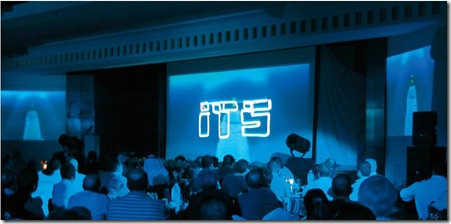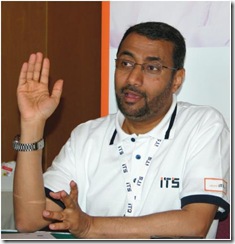Kuwaiti-born IT solutions provider International Turnkey Systems (ITS) has become a local success story with 19 offices across the Arab world. Michelle Mills travelled to Egypt and met with senior ITS executives to discuss the launch of the company’s new brand and its future direction

Amid a dazzling light display and a striking animation, the new logo and brand of ITS was launched in Sharm El Sheikh at the end of May. Managing director and general manager Khaled Faraj Al-Saeid stated that the event marked the milestone of ITS’ internal transformation to emerge as a “company without borders”.
“Today, we are transforming to become a strategic global technology partner,” stated Al-Saeid. “We changed so we could be aligned to the needs and demands of our customers. They too are changing from being regional operations to becoming global entities.”
Al-Saeid believes transformation has been part of the company’s success and reflects on the firm’s origins 27 years ago as a small operation supplying hardware, but which consistently adapted to the needs of the market by developing inhouse software applications, partnering with vendors and platform providers and combining it with enhanced service delivery.
In 1994, cellco MTC (now Zain) introduced GSM to Kuwait, becoming one of the first to do so in the region. ITS saw the opportunity to develop its Telecommunication Advanced Business Solution (TABS) to suit the enhanced requirements of operators launching mobile offerings. ITS developed the software part-time around its core business, and 14 years later, TABS is now its flagship application serving the complex billing requirements of operators including Zain, Etisalat, MTN, Orascom Telecom, Warid Telecom and Saudi Telecom.
ITS has also changed and incorporated other opportunities as it has grown and developed and the business now has three main arms of focus: telecommunications, banking (both conventional and Islamic) and higher education. The company also houses a portfolio of enterprise services, though the telecoms business remains by far the largest, comprising 65 per cent of ITS’ overall revenue.
Mohamed Zaki, assistant general manager, revealed that ITS’ rebranding programme started three years ago to reflect the company’s transformation from a local business to a global entity, with customers spanning the Middle East, north and west Africa, Pakistan and Malaysia.
“We felt that our visual image did not reflect the value that we are building and thought the old brand was a bit ‘soft’,” Zaki admits. “So we started by ensuring that the performance of different departments of the company were improving to reflect our new vision. We are now putting the brand forward to inspire the team to continue with their efforts, to go the extra mile and really deliver world class services to our customers. So the change of our logo marks the stage of improvement that we have achieved.”
Al-Saeid believes being a company that has developed from the region has been a significant differentiator from competitors, because not only has it been dealing with large players like Etisalat since 1988 and Zain since 1994, but it understands the language and culture of these companies’ individual markets.
“We have built a competency and overcome language barriers and cultural barriers. Among the Arab and Middle East countries it’s more or less a similar culture. But when we came to Africa and Asia, we established our operations over there and recruited people who are from that area, but who also understood the ITS culture and core values of the company,” Al-Saied states.
Zaki suggests that many global companies offering similar services have been unsuccessful in the Middle East because of a lack of local understanding. “There are brilliant technology companies that have tried to come to the region and implement projects, yet they failed miserably because they don’t have the adaptability to change the way they do business in this part of the world. We don’t just provide technology – IT projects always involve people and a lot of interaction has to take place with the users,” he says.
He believes this makes a lot of difference to the outcome and success of the project in general. “That’s why we say, ‘we deliver your technology and we understand your business language’,” Zaki comments.
ITS’ largest telecoms client, Zain Group, is a prime example of the cultural aspect and understanding of the region that has been essential for ITS’ development and highlights the company’s accessibility to the Middle East and Africa.

General manager Khaled Faraj Al-Saeid attributes ITS’ success to its adaptibility
“Other international companies are restricted by their time and resources in the region,” says Khaled Al Baz, group IT operations manager of Zain Group. “But ITS can provide us with assistance at any time if we need support. It makes a huge difference.”
ITS supplies Zain with its own TABS application but also provides servers, data storage and other services through partnerships with EMC, ITS2, Sun Microsystems, Verisign, Cisco and others.
Al Baz says Zain cannot afford any down time with its hardware or software applications and that ITS offers flexibility through the availability of technical support in local offices including in Bahrain, Iraq, Jordan and Sudan.
He also admits that costing is a big factor with ITS’ prices almost 50 per cent lower than competitors, though he admits this is mainly due to the history of Zain’s relationship spanning 14 years.
The Zain Group has operations in 22 countries but not all are currently using the TABS billing system. “We are in the process of introducing the billing systems to our partners in Africa [Celtel]. We need to ensure a smooth transition,” he adds.
Zain Bahrain also upgraded its existing TABS product suite late last year to the latest release with WiMAX billing support in line with the launch of its fixed and nomadic WiMAX service to residential and business customers across the kingdom.
As the offerings from telecoms providers grow, so do the complexities of the billing system and the flexibility required to accommodate each new service into the existing framework.
“For every product you see in the market where an operator launches a new service package, these are created somewhere in the backhaul system. But there are so many other pieces that are involved in this technology, that’s why partnership is important for us, such as for TABS to work we need to partner with Oracle,” Zaki explains.
Zaki says investment from partners is vital, not only financially but through the sharing of product knowledge to ensure that once products are ready, all the initial participants are ahead of the market together.
Going to market with an end-to-end solution is now a significant part of ITS’ business strategy, allowing the company to provide a total package to its clients including hardware, networking, servers, security and databases, as well as the original application software.
One partner that is benefiting significantly from this partnership is the Middle East branch of EMC, the global information infrastructure firm that is ITS’ partner of choice for storage and security applications and whom it has dealt with for the past five years.
According to Samir Achour, EMC’s channel manager for Middle East and north Africa, ITS is EMC’s major direct partner in the region and last year business from ITS contributed 10 per cent of EMC’s regional revenue. EMC’s regional growth stood at 80 per cent between 2006-2007, according to Achour, and therefore ITS grew its storage and information management business similarly.
Achour is also optimistic over the future growth of EMC’s subsidiary companies VMware, which deals with virtualisation; RSA, which deals with security; and Documentum which deals with content management. These are all areas of importance for telcos as their information and network-capacity requirements continue to expand.
ITS’ general manager Al-Saeid is keen to build on the company’s growth and successful partnerships to further enhance its offerings. With the growing convergence between telecommunications and banking in areas such as mobile payments and mobile international remittances, Al-Saeid is confident his company is well positioned to assist both telcos and banks in this transition. ITS currently commands 75 per cent of the market share for Islamic banking solutions and works with conventional banks as well.
“We believe the convergence will affect us positively because it will open up more business opportunities to us. Banks would like a company that deals with telecommunications companies as well, because that’s a delivery channel for them. It will help them by having an organisation that has a good understanding of the banking and telecommunications industries and that will be reflected in our product and our services to them.”
Al-Saeid expects the future direction of the company will reflect the rapid changes in the telecoms industry, keeping abreast with the required products and services and playing an active role in new technologies such as WiMAX. This will include expanding its operations support systems (OSS) business.
“The changes are happening so fast in telecoms – the industry needs more end-to-end solutions. We have found that operators would like to deal with just one party, they don’t want to deal with 15 or 20 solutions providers and we are positioning ourselves to be that one company.”
International Turnkey Systems (ITS)
Established: 1981
Head office: Kuwait
Annual revenue: US$150 million for 2007. Target for fiscal year ending September 2008 is US$250 million.
Number of employees: 2000
Regional offices: 19
Countries: Algeria, Bahrain, Bangladesh, Egypt, Iraq, Jordan, Kuwait, Lebanon, Oman, Pakistan, Qatar, Saudi Arabia, Sudan, Syria, UAE, Yemen
Products and activities: Integrated IT solutions, including in-house developed software, for the telecommunications, higher education and banking (conventional and Islamic) sectors.





0 comments ↓
There are no comments yet...Kick things off by filling out the form below.
Leave a Comment